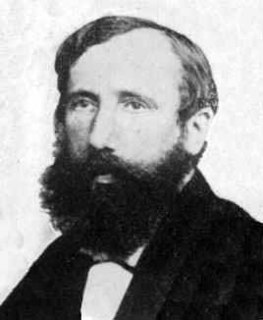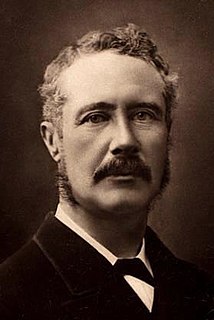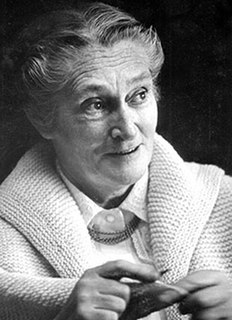Top 273 Remark Quotes & Sayings - Page 5
Explore popular Remark quotes.
Last updated on December 18, 2024.
Sylvia had given him a scalding lecture, the gist of it being that whatever a woman enjoyed wearing was feminine and anything she didn't enjoy wearing wasn't, and if he was too stubborn and old fashioned to understand that, he could go and soak his head in a bucket of cold water. He hadn't quite forgiven her yet for saying they would have to look hard to find a bucket big enough to fit his head in to, but he admired the sass behind the remark.
The surest way to make a monkey of a man is to quote him. That remark in itself wouldn’t make any sense if quoted as it stands. The average man ought to be allowed a quotation of no less than three sentences, one to make his statement and two to explain what he meant. Ralph Waldo Emerson was about the only one who could stand having his utterances broken up into sentence quotations, and every once in a while even he doesn’t sound so sensible in short snatches.
A certain critic -- for such men, I regret to say, do exist -- made the nasty remark about my last novel that it contained 'all the old Wodehouse characters under different names.' He has probably by now been eaten by bears, like the children who made mock of the prophet Elisha: but if he still survives he will not be able to make a similar charge against Summer Lightning. With my superior intelligence, I have out-generalled the man this time by putting in all the old Wodehouse characters under the same names. Pretty silly it will make him feel, I rather fancy.
Sometimes he would advise me to read poetry, and would send me in his letters quantities of verses and whole poems, which he wrote from memory. 'Read poetry,' he wrote: 'poetry makes men better.' How often, in my later life, I realized the truth of this remark of his! Read poetry: it makes men better.
... I was reminded of a remark of Willa Cather's, that you can't paint sunlight, you can only paint what it does with shadows on a wall. If you examine a life, as Socrates has been so tediously advising us to do for so many centuries, do you really examine a life, or do you examine the shadows it casts on other lives? Entity or relationships? Objective reality or the vanishing point of a multiple perspective exercise? Prism or the rainbows it refracts? And what if you're the wall? What if you never cast a shadow or rainbow of your own, but have only caught those cast by others?
The book was in her lap; she had read no further. The power to change one’s life comes from a paragraph, a lone remark. The lines that penetrate us are slender, like the flukes that live in river water and enter the bodies of swimmers. She was excited, filled with strength. The polished sentences had arrived, it seemed, like so many other things, at just the right time. How can we imagine what our lives should be without the illumination of the lives of others?
I originated a remark many years ago that I think has been copied more than any little thing that I've ever said, and I used it in the follies of 1922. I said America has a unique record. We never lost a war and we never won a conference in our lives. I believe that we could without any degree of egotism, single-handed lick any nation in the world. But we can't confer with Costa Rica and come home with our shirts on.
The two of you together are a menace,” Penelope remarked. “My aim in life,” Lady Danbury announced, “is to be a menace to as great a number of people as possible, so I shall take that as the highest of compliments, Mrs. Bridgerton.” “Why is it,” Penelope wondered, “that you only call me Mrs. Bridgerton when you are opining in a grand fashion?” “Sounds better that way,” Lady D said, punctuating her remark with a loud thump of her cane.
Democracy appears to be safer and less liable to revolution than oligarchy. For in oligarchies there is the double danger of the oligarchs falling out among themselves and also with the people; but in democracies there is only the danger of a quarrel with the oligarchs. No dissension worth mentioning arises among the people themselves. And we may further remark that a government which is composed of the middle class more nearly approximates to democracy than to oligarchy, and is the safest of the imperfect forms of government.
He that would travel for the entertainment of others, should remember that the great object of remark is human life. Every Nation has something peculiar in its Manufactures, its Works of Genius, its Medicines, its Agriculture, its Customs, and its Policy. He only is a useful Traveller, who brings home something by which his country may be benefited; who procures some supply of Want, or some mitigation of Evil, which may enable his readers to compare their condition with that of others, to improve it whenever it is worse, and whenever it is better to enjoy it.
All who say the same things do not possess them in the same manner; and hence the incomparable author of the Art of Conversation pauses with so much care to make it understood that we must not judge of the capacity of a man by the excellence of a happy remark that we heard him make. Let us penetrate, says he, the mind from which it proceeds. It will oftenest be seen that he will be made to disavow it on the spot, and will be drawn very far from this better thought in which he does not believe, to plunge himself into another, quite base and ridiculous.
There is something about talking in the night, with the shreds of sleep around your ears, with the silences between one remark and another, the town dark and dreaming beyond your own walls. It draws the truth out of you, straight from its little dark pool down there, where usually you guard it so careful, and wave your hands over it and hum and haw to protect people's feelings, to protect your own . . . You can bring out the jaggedest feelings - if you are my wife and know how to state them calm - into the night quiet. They will float there for consideration, harming no one.
Woody Allen once said: "You know there must be intelligent life in space. The question is do they have good Chinese restaurants and do they deliver?" Which is really a joke, but it is also a very profound remark. When you say do they have good Chinese restaurants, what you're really saying is, "How much are they like us?" And when you say, "Do they deliver?" you're saying, "Can they get here?" Both of which are profound questions. And at the present, we have no answers.
"I think we'll have a good potato crop this year," a newspaper editor told his housekeeper one morning. "No such thing," asserted the housekeeper. "I think the crop will be poor." Ignoring her remark, the editor caused to be inserted in the evening paper his estimate of the crop situation. That night when he returned home he found the housekeeper waiting for him with a sheepish grin on her face and a copy of the paper in her hand. "I was wrong," she said apologetically. "It says right here in the paper that the crop will be excellent this fall."
If Christianity cannot present evidence that the soul is immortal, then they have nothing to offer the masses, eternity in heaven with God or hold over their heads suffering forever in hell. They need the immortality of the soul. I did my research, it's not in the Bible, so what do they do? They relied on Judaism, which has always believed in the immortality of the soul. I start checking on that and I look in the Judaica Encyclopedia and what do I find? Their remark that Judaism probably got the immortality of the soul from the Greeks, so I go back further, where it all started with Plato.
I think it was the beginning of Mrs. Bond's unquestioning faith in me when she saw me quickly enveloping the cat till all you could see of him was a small black and white head protruding from an immovable cocoon of cloth. He and i were now facing each other, more or less eyeball to eyeball, and George couldn't do a thing about it. As i say, I rather pride myself on this little expertise, and even today my veterinary colleagues have been known to remark, "Old Herriot may be limited in many respects, but by God he can wrap a cat.
Good movies make you care, make you believe in possibilities again. If somewhere in the Hollywood-entertainment world someone has managed to break through with something that speaks to you, then it isn’t all corruption. The movie doesn’t have to be great; it can be stupid and empty and you can still have the joy of a good performance, or the joy in just a good line. An actor’s scowl, a small subversive gesture, a dirty remark that someone tosses off with a mock-innocent face, and the world makes a little bit of sense.
It has been said by a distinguished philosopher that England is "usually the last to enter into the general movement of the European mind." The author of the remark probably meant to assert that a man or a system may have become famous on the continent, while we are almost ignorant of the name of the man and the claims of his system. Perhaps, however, a wider range might be given to the assertion. An exploded theory or a disadvantageous practice, like a rebel or a patriot in distress, seeks refuge on our shores to spend its last days in comfort if not in splendour.
I humbly believe our life is to learn our nothingness and His being everything; when we agree with Him that we are nothing and not astonished at our evil nature breaking forth, when we are willing for the last to be first, when we are willing to be the least in Heaven that every one we know should be higher than ourselves, then, I think, our lesson is learnt. If we are annoyed at any disparaging remark or conduct of our fellows, it is because we are not yet fully aware of our being nothing.
I'm not comparing myself with Donald Trump or anybody else - but the people are fed up with the politicians ignoring the problem. The people are fed up by if they say something about the influx of the mass immigration from mostly Islamic countries, what they really feel is the threat for the safety of their daughters who go to school or their parents who walk in the park or themselves going shopping on a Thursday evening in Holland - they are being called racist if they make a remark about, 'hey this is not our country anymore.'
Charles Williams has said of the Lord's Prayer, "No word in English carries a greater possibility of terror than the little word 'as' in that clause." What makes the 'as' so terrifying? The fact that Jesus plainly links our forgiven-ness by the Father with our forgiving-ness of fellow human beings. Jesus' next remark could not be more explicit: 'If you do not forgive men their sins, your Father will not forgive your sins.'
When you're cruising down the road in the fast lane and you lazily sail past a few hard-driving cars and are feeling pretty pleased with yourself and then accidently change down from fourth to first instead of third thus making your engine leap out of your hood in a rather ugly mess, it tends to throw you off stride in much the same way that this remark threw Ford Prefect off his.
Pass by the synthetic yarn department, then, with your nose in the air. Should a clerk come out with the remark that All Young Mothers In This Day and Age (why can't they save their breath and say "now"?) insist on a yarn which can be machine-washed and machine-dried, come back at her with the reply that one day, you suppose, they will develop a baby that can be machine-washed and -dried.
We put pride into everything like salt. We like to see that our good works are known. If our virtues are seen, we are pleased; if our faults are perceived, we are sad. I remark that in a great many people; if one says anything to them, it disturbs them, it annoys them. The saints were not like that - they were vexed if their virtues were known, and pleased that their imperfections should be seen.
When they [visitors to his studio:] learn about the six-week daily-strip deadline and the 12-week Sunday-page deadline, a visitor almost never fails to remark: "Gee, you could work real hard, couldn't you, and get several months ahead and then take the time off?" Being, as I said, a slow learner, it took me until last year to realize what an odd statement that really is. You don't work all of your life to do something so you don't have to do it.
There are some good things and some fantastic ones in Auden's early attitude; if the reader calls it a muddle I shall acquiesce, with the remark that the later position might be considered a more rarefied muddle. But poets rather specialize in muddles and I have no doubt which of the muddles was better for Auden's poetry: one was fertile and usable, the other decidedly is not. Auden sometimes seems to be saying with Henry Clay, "I had rather be right than poetry"; but I am not sure, then, that he is either.
There were nights when he took a deal more rum and water than his head could carry; and then he would sometimes sit and sing his wicked old wild sea-songs, minding nobody... Often I have heard the house shaking with Yo-ho-ho and a bottle and rum, all the neighbours joining in for dear life with the fear of death upon them and each singing louder than the other to avoid remark. Fiften men on the dead man's chest, Yo-ho-ho and a bottle of rum! Drink and the devil have done for the rest. Yo-ho-ho and a bottle of rum!
Happiness and the absurd are two sons of the same earth. They are inseparable. It would be a mistake to say that happiness necessarily springs from the absurd discovery. It happens as well that the felling of the absurd springs from happiness. "I conclude that all is well," says Oedipus, and that remark is sacred. It echoes in the wild and limited universe of man. It teaches that all is not, has not been, exhausted. It drives out of this world a god who had come into it with dissatisfaction and a preference for futile suffering. It makes of fate a human matter, which must be settled among men.
We may remark in passing that to be blind and beloved may, in this world where nothing is perfect, be among the most strangely exquisite forms of happiness. The supreme happiness in life is the assurance of being loved; of being loved for oneself, even in spite of oneself; and this assurance the blind man possesses. In his affliction, to be served is to be caressed. Does he lack anything? no. Possessing love he is not deprived of light. A love, moreover, that is wholly pure. There can be no blindness where there is this certainty.
Anyone who has raised more than one child knows full well that kids turn out the way they turn out - astonishingly, for the most part, and usually quite unlike their siblings, even their twins, raised under the same flawed rooftree. Little we have done or said, or left undone and unsaid, seems to have made much mark. It's hubris to suppose ourselves so influential; a casual remark on the playground is as likely to change their lives as any dedicated campaign of ours. They come with much of their own software already in place, waiting, and none of the keys we press will override it.
The universe is one being. Everything and everyone is interconnected through an invisible web of stories. Whether we are aware of it or not, we are all in a silent conversation. Do no harm. Practise compassion. And do not gossip behind anyone's back - not even seemingly innocent remark! The words that come out of our mouth do not vanish but are perpetually stored in infinite space, and they will come back to us in due time. One man's pain will hurt us all. One man's joy will make everyone smile.
'When you were little, what inspired you to feel this way?'" Then he paused and asked, "Looking in the mirror and having it crack in two?" Instead of clobbering him, I laughed-the kind of laugh that escapes into the air before you can catch it. The kind of chuckle that shows a tiny form of acceptance. Trevor obviously didn't expect me to find his remark entertaining. He was primed for a fight. We both cracked up and locked eyes. His gaze lingered a little too long, not in a creepy way, but in a way that says I'm not ready to let this moment go.
...But nature does not say that cats are more valuable than mice; nature makes no remark on the subject. She does not even say that the cat is enviable or the mouse pitiable. We think the cat superior because we have (or most of us have) a particular philosophy to the effect that life is better than death. But if the mouse were a German pessimist mouse, he might not think that the cat had beaten him at all. He might think he had beaten the cat by getting to the grave first.
































